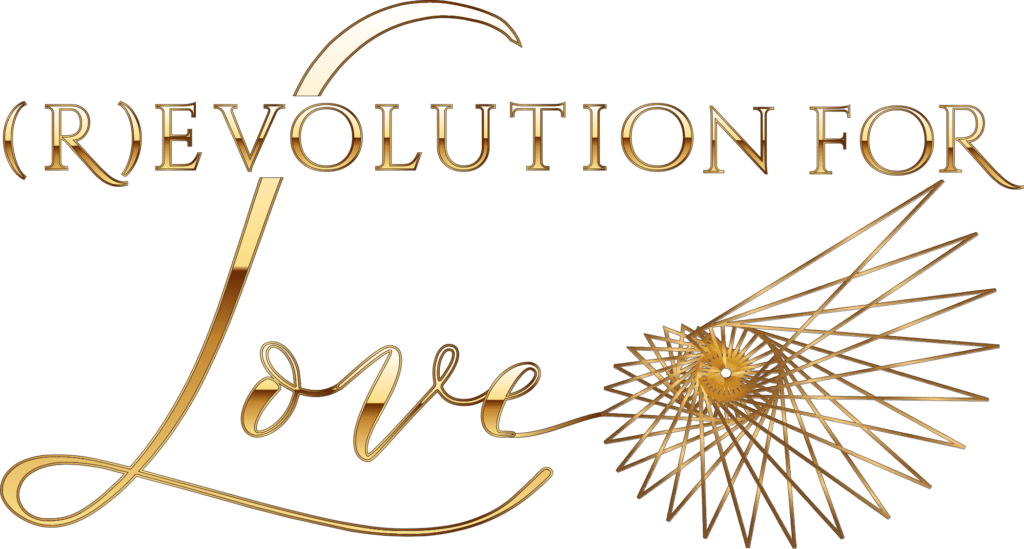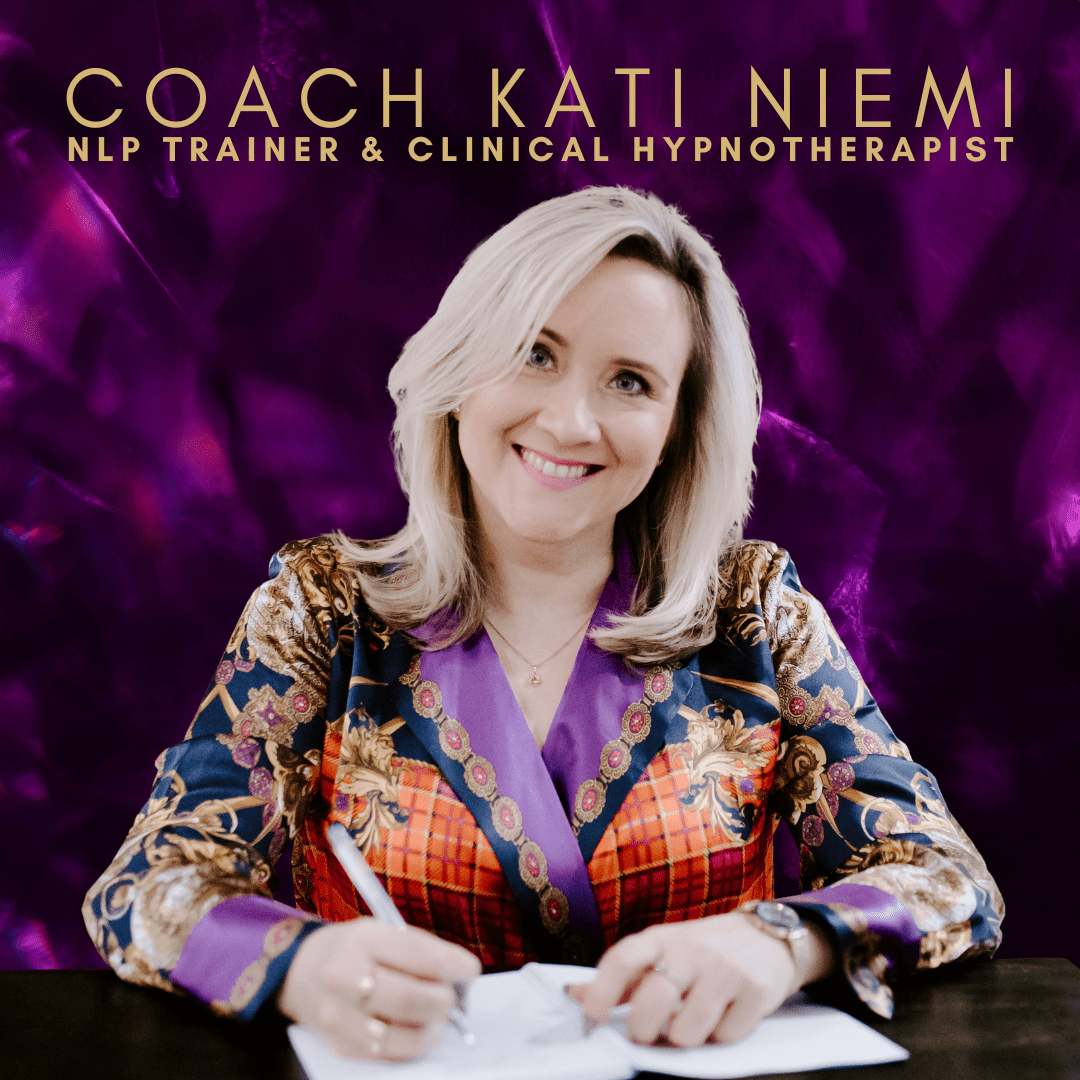When we hit middle age, many of us go through a natural process of change. Sometimes referred to as “midlife crisis”. It can manifest itself as dissatisfaction towards your job or your spouse. Or anything else that you are mostly preoccupied with in your life. Midlife crisis feels like restlessness and impatience. You begin to notice that certain things don’t feel right anymore but you don’t know how to change them. At least, not at once or easily.
By the time we reach middle age, life around us has changed many times over. Yet your own thinking and behaviour may still be those of your teenaged or at least your younger self. Midlife crisis is an opportunity to grow. Both for your relationship and, most importantly, for yourself.
In this article we’ll discuss the connection between an age crisis and relationship issues:
- What is a midlife crisis?
- How does a midlife crisis show in divorce and marriage statistics?
- Is midlife crisis still a real phenomenon?
- Why do relationships go into crisis specifically when middle-aged?
- How can relationship or age crisis be a good thing?
- How to survive a relationship and/or age crisis
- Why is willpower and positivity not enough?

Are relationship problems simply just stress and lack of sleep?
Why does stress and lack of sleep cause problems in a relationship? Or do bad relationships cause stress and sleeplessness? How to get help?
Does midlife crisis even exist?
In my book (R)evolution for Love, I have related several true stories as told by the men and women I interviewed. Some of their experiences were linked with midlife crisis and its many manifestations. I heard stories about secret affairs and one-night stands.
When I was considering divorce, some people questioned my motives: “I you sure you are not just going through a midlife crisis, why on earth would you want a divorce?” I understood their pain. After all, these people know me and love me dearly. However, I had done my homework on midlife crisis. I knew how to explain to them what I was thinking and going through.
In The (R)evolution for Love – A Better Relationship or a Brilliant Break Up? I write:
"When you divorce at forty, you may hear comments like “leaving now is just a stupid whim” or “you are just having a midlife crisis” and “you should wait till it blows over”. People whose relationship has hit a new low after they have had children or when the children have flown the nest often hear the same advice. According to scientists such as the world-renowned psychologist Kathleen Stassen Berger, however, there is no evidence that midlife crisis even exists: it is merely a misinterpretation originating in the 1970s that for some reason has lived on in people’s minds. Why should you blame your divorce on a crisis in the first place?
A crisis is usually nothing more than a milestone in an ongoing change process that serves as a litmus test for your relationship. A crisis can help open one’s eyes to see what’s happening around them, including in their relationship. Crises have their place; it is up to us to use that opportunity to grow. Once you set out on a journey of personal growth and self-examination to improve your self-awareness and self-esteem, chances are that the process will also give you strength to face change, and that may or may not include an impetus to leave your partner."Kati Niemi: (R)evolution for Love - A Better Relationship or a Brilliant Break Up?
Why is it, then, that so many relationships crises coincide with middle age? In this blog, I will discuss the concept of midlife crisis. I will also go through potential solutions as well as statistical evidence on the relationships and divorces of middle-aged people at different ages.
Why are relationships prone to undergo crisis at the same time as we go through the midlife crisis?
Are your roles and communication style in your relationship stuck in the pattern that was once acceptable? Are you not used to having to be flexible in your relationship? There’s nothing like a life crisis to shake a relationship out of the rut. If both partners are ready for change, this can be a positive development. Change takes willingness to rethink our attitudes and behaviours.
Sometimes to survive, your relationship would need more flexibility and compromise from both you than you are capable of. When a person is hurting, they will try and find a way out of the situation one way or another. Many don’t want to hear of couples or individual counselling and rather have affairs and cheat just to keep going for yet another month.

SIGNS OF A BREAK UP: How to tell if my partner is going to leave me?
What are the typical signs of a breakup? How to spot the signals of an imminent separation or divorce? Is my partner going to leave me?
What else could they do?
Is there a way that they could make their long-term relationship work better?
Is it even possible as an individual to survive midlife crisis unscathed, let alone together with your spouse?
How much can you and should you change your relationship so that it could survive?
Read more about open and long-distance relationship from these articles:

Open relationship – just an option among many others?
What is an open relationship? What could we all learn from them? Do people in open relationships not experience jealousy?

How to Make Your Long Distance Relationship Work?
Having a problematic long distance relationship? How to make a long distance relationship work during lockdown?
Why is a relationship or midlife crisis a good thing?
Emotional and intellectual growth, which (I hope!) is a natural part of everyone’s aging process, does not occur as a steady, even evolution until you finally touch the sky. Usually, growth happens as an outcome of a difficulty in life. We must make room for mental development because that room, or more precisely time, is seldom found by accident. We must make an effort to find time for growth and change.
Middle age often coincides with our busiest years. We are busy because we have too many things going on at the same time, probably partly because of peer pressure. We imitate others and join the rat race just because that’s what people do. The faster we run by our partner and ourselves, the faster we will leave our happiness and relationships behind. Positive change takes time and space.
Similarly, a positive relationship takes time and space for you to enjoy the company of your partner.
Otherwise we will be diminished into doormats and chauffeurs for our kids while also “busy” building a career and looking after elderly parents.
Nobody wants to be a slave.
Not at home and not at work. Yet few of us take decisive action to make space and time to live more freely and a more interesting life. Then comes the car crash that is midlife crisis. Suddenly, there is no alternative: you must find time and space, now or never.

Is Alcoholism Ruining Your Relationship?
Alcoholism doesn’t define you but alcohol dependence (substance use disorder) may ruin your marriage or romantic relationship.
So, is midlife crisis a terrible thing or a long-overdue liberator and reminder of things that really matter, including during those “busy” years?
A discontented middle-aged whiner will make their midlife crisis seen and heard at home and work.
If you feel that your boss is not giving you the opportunities you deserve for professional development, you will feel like finding another job. Likewise, if you feel relationship you don’t have the space to grow in your relationship or even enjoy your life together, you will feel like finding another partner.
However, no change in life happens by changing the exterior factors, such as jobs or partners. Naturally, they may be necessary decisions to ensure that you have an open path for future growth for a long time to come. Jumping ship to another job or someone else’s arms is not the cure for midlife crisis.
Your career or relationship crisis will not be resolved by you protesting how hard your life is and how “busy” your life is (I use the inverted commas deliberately, read this article to find out why: THE CORONA CRISIS AND THE BUSY YEAR: Make love not stress?) If midlife crisis turns you into a passive-aggressive martyr instead of a dynamic optimist, no wonder if your job and your relationship feel unsatisfying.

Perfectionism May Ruin Your Relationship
Perfectionism can bring unwanted problems into a relationship, but it can be helped! Read to find out warning signs to be aware of.
If you don’t actively look for tools to sustainably resolve your situation and embark on an internal learning journey, your midlife crisis may get the better of you. Even if you eventually settle into a slightly easier period in life simply because you are too exhausted to fight, the next crisis will be just around the corner ready to hit you, this time maybe even harder.
When are you old enough to consciously take charge of your life rather than just gravitate towards the next crisis?
At what age are you old enough to grow up and look for tangible and constructive ways to work on yourself and face the challenges and crises that will inevitably come your way at some point? Stop procrastinating the pain of growing stronger and wiser. Turn your midlife crisis into a resource. Otherwise you risk missing out on the experiences and valuable lessons that you are supposed to learn from.
Read here why too many adults fail to claim the space they need to grow and to consciously develop themselves: How to improve your wellbeing through self-development?
There is a lot of talk about various crises points in our lives. However, crises really are just normal milestones of change. The word “crisis” gives the phenomenon a negative tone to something we are naturally supposed to go through. If you have read my blog or my book (R)evolution for Love, you will know that I place great importance on words. Words and the connotations can have a very profound and negative impact on the way we think.
You too can get through your relationship and growth pains during your midlife crisis
I have suffered my fair share of growth pains. I went kicking and screaming down my growth path, until I learnt to accept that pain and discomfort are the only way to growth. And no, I am not quite there yet, and I hope I never will be. I firmly belief that growth is part of life and once we stop growing we stop living. That is why I’d rather experience the highs and lows that my life has to offer in full rather than trudge an uneventful, monotonous albeit painless path.

A Relationship Guide That Works
A solution-centred relationship guide that works. Make that decision: should you stay or go? Should you work on your relationship or give up?
I have always been passionate about development and developing. I love to brainstorm and think of ideas, to create something new and to change the world. And it has been rewarding. I’ve enjoyed every minute.
But the most painful development project I have faced is self-development.
I have experienced how the scales have fallen from my eyes and I have seen just how stupid some of my fixed ideas are and how badly I sometimes behave. I wanted to hide the ugly and unpleasant aspects of life and focus only on the positive, new, pleasant things ahead.
Until there came a point that I could no longer avoid facing up to the most destructive and disagreeable words I was saying internally. I had to hear them and to accept them. Hear the and accept the sadness and pain that those words were expressing. And had been expressing for many years. I embarked on my internal emotional journey under the helpful guidance of my instructors and peers over several years as I studied NLP (neuro-linguistic programming). www.nlpyhdistys.fi
I met some amazing people who were also learning to accept their growth pains. Growing together was easier than going it alone.
Why are willpower and positive thinking not enough?
I am naturally easily excited and I am endlessly curious and also quite resilient. All my life, I had rolled my sleeves and pushed through any obstacle that had the misfortune of landing on path. But the only tools I knew how to use were willpower and positive thinking.

Relationship Conflict: How to Diffuse Confrontation
Tips for diffusing conflicts in your relationship to improve your connection. Conflict resolution skills for happy and healthy relationships!
After years of studied self-development and mental growth, I have now learnt to combine those tools with an ability to pause, practice humility and process my grief with myself.
As I wrote in an earlier blog, conscious grieving can be a key to a much better, sustainable and stable wellbeing than positive thinking and willpower, which were the only things that I relied on in my life when I was younger. Thanks to the resilience I had built since my childhood, I was able to work on my mental growth quite thoroughly, deeply and forcefully.
My inquisitiveness sustained my focus as I delved into my most steadfast “truths”. Those would eventually also turnout to be my least sensible “truths”. I would look at them from any imaginable angle. And I put them through such a mill that in the end there was nothing but a clean slate left. Of course, we accumulate on our reserve of “big data” every day. No doubt, I have plenty of empowering, saddening, enriching, rewarding and ultimately hugely enjoyable myth-busting to do for the rest of my life. That work will continue through whatever storm or lull I happen to be going through.
Fortunately, I have learnt to use a wide range of tools. These tool help me process my small or large-scale crises. They are also vital in managing normal change processes that are part of life at work and at home.
How did I develop myself to overcome my growth pains and midlife crisis?
NLP has given me an arsenal of methods that helped me move on with my life. I needed those methods both at work and at home. Like so many people in their midlife crisis, I changed jobs and ended my marriage about the same time once I hit middle age. And I loved my new career and my single life and the new relationship that followed.

Can secret affairs and one-night stands keep a relationship alive?
The love and passion in a secret affair can be the most amazing thing to experience. What reason is good enough to have a secret affair?
But an interesting job, happy days as a single woman nor a good relationship can’t be the root cause of a person’s happiness, they are the consequence.
Happiness comes from within.
Not from my work, not from men. Both my midlife “crisis” and the personal growth that sustained me through the crisis came from within. I engaged in conscious mental development and practice. My coaches and the people around me supported me. Eventually, I learnt to accept help and not to fight hardships alone and suffer in consequence.
After years of study, practice and training, I finally completed my NLP Trainer qualification and I wrote my book Up. I then continued exploring the depths of the mind, the subconscious and unconscious, through hypnotherapy studies.
I completed my hypnotherapist qualifications through the Finnish Association of Hypnosis and Institute of Hypnotherapy in London. Now I’m a fully qualified clinical hypnotherapist. I provide support and help to my clients with even a wider selection of tools and methods.
My passion is to help my clients to shake up their minds and thoughts, which is where the midlife crisis or thoughts about breaking up live. If you would like the support of a goal-centred coach inspired by the challenges of working and family life, be in touch!

Recovering from a break up: 10 practical tips for moving on
Is recovering from a break up possible when everything is confusing, including your own emotions? How to get over a relationship and move on?
I am right here, just a click away, happy to help you 🙂
If you want to change your life in your midlife, it will not happen unless something in you changes. That one thing could be the way you think.
If you are unhappy with your current relationship, you will not get a better relationship just by switching to a new partner. Sad but true.
It may feel easier to live with someone who is more in line with the expectations you have at this point in your life. However, I advise you you not to go down that road. I say this because 95% of your actions are based on unconscious thoughts. Your thoughts are not facts and, surprisingly enough, they don’t always work in your favour.
We all want to come across as smart and attractive, and we want to be seen and heard and accepted the way we are. Yet, sometimes what is really letting us down is our own behaviour. And that behaviour is based on our beliefs about ourselves and the world. Changing the way we think will make it easier for us to be the seen and heard. If your current relationship is awful, it is safe to say that neither you nor your partner did a fantastic job.
Who hasn’t occasionally said unkind words just because they are tired? Which one of us is always able to talk about their concerns constructively and neutrally?
Perhaps you saw things too often from your perspective only. Or maybe you seldom voiced your own needs.
Perhaps you let action speak louder than words, when words – loving words – were what were needed the most. Did you go on talking like a broken record, when what was needed was real deeds and tangible gestures.

What is a good reason for breaking up?
What is a good reason to break up? What are the most common reasons for breaking up? Is “a good reason” really a good reason?
Maybe you were not ready to go along with your partner’s ideas. Perhaps these ideas had to do with sex. Or did you push your own agenda and ideas crudely without listening to your partner?
Perhaps you are one to have a strong opinion just about anything and have hard time listening to your partner’s views. Or maybe you don’t have an opinion about anything – “whatever…”.
You may have been too kind to stand your ground. Or too harsh towards your partner with your scathing words and pregnant silences.
Are you aware of your unconscious thoughts that are at the root of your midlife crisis – the thoughts you eventually must face up to?
Perhaps the above list of behavioural opposites touched a nerve. Did they remind you of a situation were you were wrong to do or say what you did? What you would not be caught dead saying or doing in a “normal” situation with a decent partner.
And yet, that’s exactly how you have behaved with your current partner, time after time, year after year. This means those manners have become normal for you.
Considering that 95% your actions are based on unconscious thoughts, how conscious are you of your most persistent beliefs. These beliefs are the ones that have resided deep in your subconscious since your childhood, teens or the early days of your relationship?

When should you break up? Find out if you should stay together.
When is it pointless to stay together? When would you be better off breaking up? How do you know if you should break up or stay together?
If you had to pick one of the most harmful beliefs out of all that “big data” of 95% to stop you from repeating the same mistakes, what would that belief be?
If analysing your beliefs deeper than the surface is a new exercise for you, where would you start? What aspects of self-development would help you through your midlife crisis and the future years with greater ease?
Midlife crisis is a synthesis of your thoughts, feelings and actions. The same elements also hold the key to resolving than crisis.
If you are looking for a change in your relationship but not in yourself, you are putting your relationship under uneven and unfair pressure. Focusing on what’s wrong in your partner and your relationship is dangerous. I you pay no attention to your own behaviours and thoughts that are no longer fit for purpose, your risk finding yourself on the verge of a break up faster than you think.
But I’m not saying that you will break up. In fact, many couples teeter on that verge for decades without breaking up but also without mending their relationship. Most of us know couples like this. You may be unknowingly following their example and strategies when facing challenges. We are nothing more than each other’s mean average if we let our lives run on autopilot.
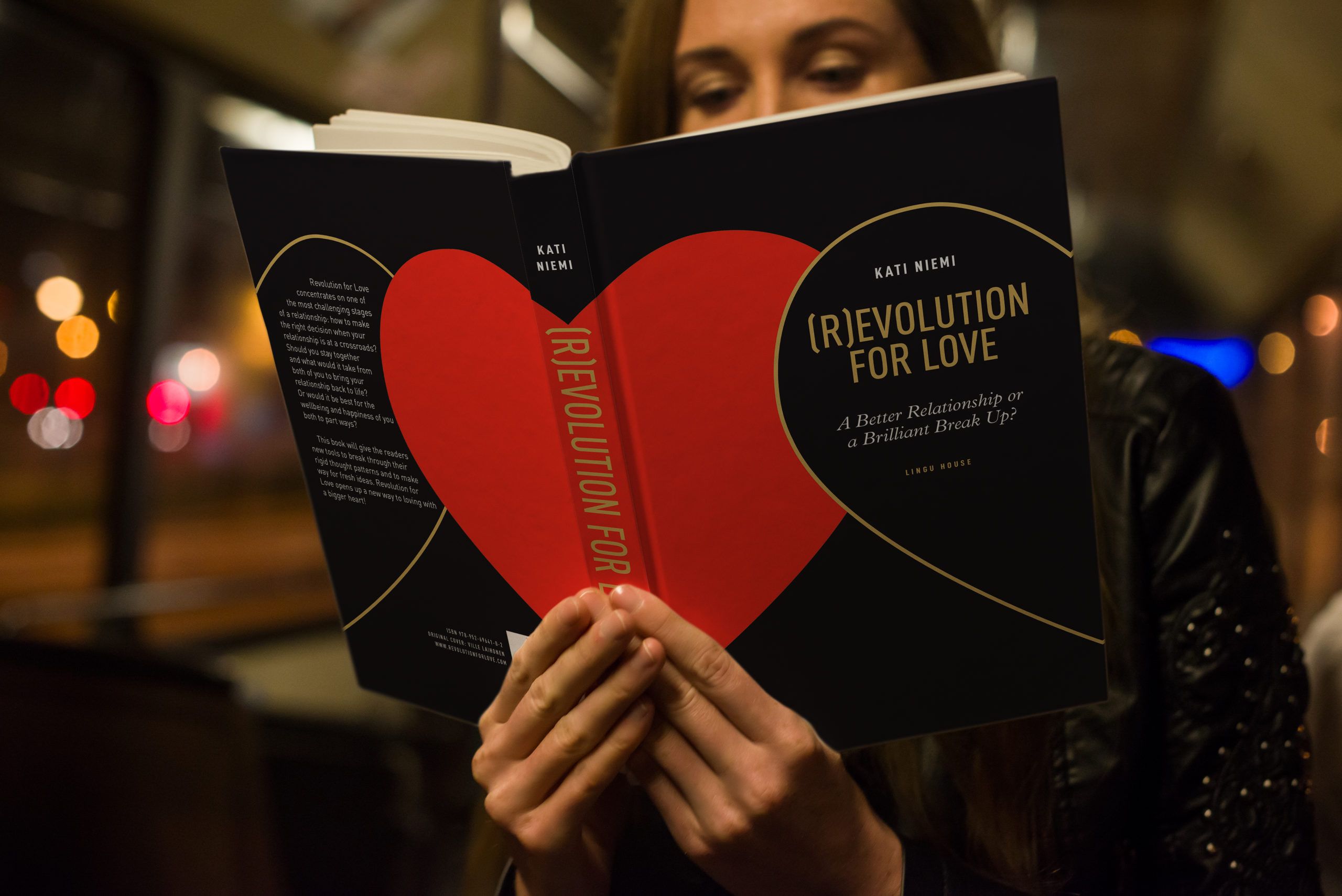
(R)evolution for Love – The Book
* I have selected every editorial product for your benefit. Sometimes you may get some discounts and I may receive a share from purchases made
You can’t improve your relationship unless at least one of the behaviours or patterns between you two changes. Mechanically changing our behaviour is not necessarily difficult. However, most of our actions rely on our unconscious mind. Hence, no change in behaviour is sustainable without a change in thinking.
Action is guided by thought (unconscious and conscious), which again guides feelings. And feelings drive us to act faster than we think – i.e. are conscious of. In other words, our thoughts, feelings and actions form an inner synthesis. Everything affects everything. One building block cannot be moved without readjusting all others.
Midlife crisis helps readjust the building blocks of your life and relationship
When we are going through a midlife crisis, it may seem that the building blocks of our lives are all over the place. It’s a mess and it can be infuriating. But don’t let the mess lead to more mess. Look at that mess with calm interest and an open mind.
If the building blocks are not where you laid them but lie all scattered around, maybe it gives you freedom to see a potential for a new, much better building.
Building something new is easier with building blocks that are already loose. But if you try to rebuild the same construct that you and your partner built in your twenties, you are stuck in the past.

How to improve your wellbeing through self-development?
Science has revealed: some adults are not mentally sufficiently developed. How to improve your wellbeing through self-development?
Have faith that even if you were happy with your old construct, you can also be equally if not more satisfied with a new construct that is more in tune with the life you lead today.
In twenty years, you will have changed the way you think about many things. Why would your relationship somehow be exempt? Why should it stay unchanged like a mausoleum?
Your midlife crisis is caused by your past but can’t be remedied by reliving the past.
We may easily blame our partner for no longer being the person you once got together with. We blame them for our relationship not being as good as it used to be. Denying your relationship, your partner or yourself growth is the most destructive way you could ever choose – consciously or unconsciously – as a response to your midlife crisis. Read more: “Darling, never change!” Are you serious?
The tighter your grip on the past, the wider the gap between your behaviour and reality.
Say a warm thank you to your past for all it has given you and bid your farewell. Live in the now. See where the building blocks of your relationship have landed and take your time thinking what you could build from them. Talk about which building blocks you want to keep for your next construct. And don’t even dream of never having to rebuild it again.

FREE EBOOK ‘I love you but…’ – To Break Up or Not to Break Up?
Refocus your energy now to improve your love life! This FREE ebook ‘I love you but…’ will help you move towards a better relationship or
Years ago, there was a time when your children were not born yet. Years from now, your children will no longer live with you. If you both worked hard at your careers, you will know that at some point you will retire.
Leave your past behind and let your future take shape when it’s time.
Focus on the hear and now. What is it that you want now? How about your partner? What would make you happy today? How about your partner?
You don’t have to want the same things you wanted in the past, be it certain type of sex or anything else that you did together as a couple. You don’t have to like certain type of sex or anything else today to be allowed to enjoy them in the future. Live in the moment. Today. By your partner’s side. With an open mind and heart. Accept the new thoughts that come to you and let go of the old. Renew yourself and consciously give yourself permission to grow. Look for interesting self-development courses and content, find a personal coach. And let your partner do the same.
Neither your current nor a future relationship can guarantee you your fundamental happiness.
The overly romantic notion that only a relationship with the right person can make us blissfully happy is complete nonsense. That is, if you want a blissfully happy relationship.
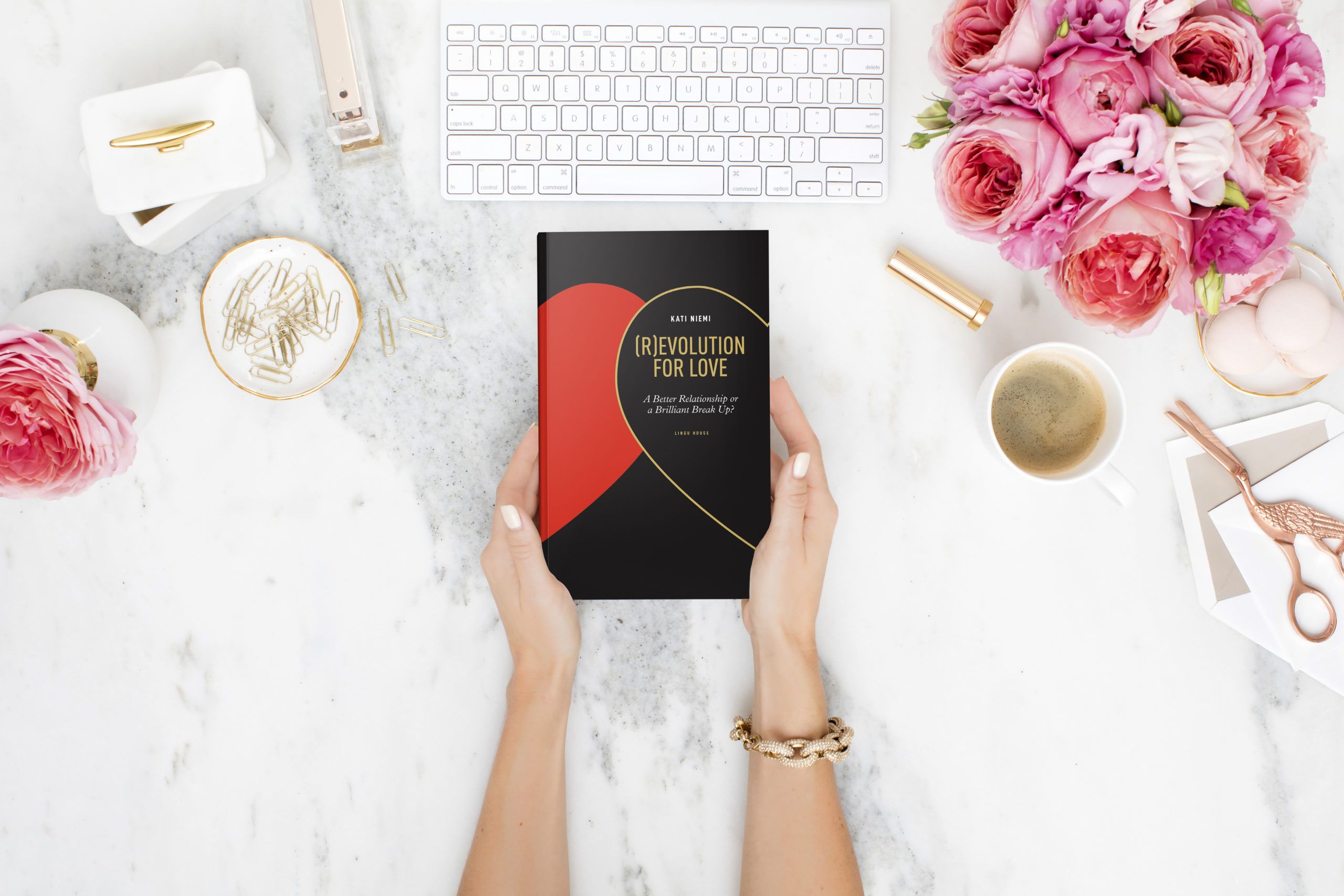
“FIVE STARS!” Book reviews: (R)evolution for Love (Amazon Books)
“Five Stars!” Editorial reviews and reader reviews of (R)evolution for Love – A Better Relationship or a Brilliant Break Up? Amazon books
If you know how to rebuild your life every morning, with every breath, you will notice that you can be happy every minute of your life. Even at a time of sadness, your fundamental happiness will carry you. Whether you have a partner by your side or not.
If you cling to your partner, both of you will sink. It is nobody’s duty to raise you up or to be the wind beneath your wings. We make each other happy simply by enjoying each other’s joy. We can take comfort in being able to help each other in our moments of sorrow.
If you are unhappy with your relationship, you are in fact unhappy with yourself.
Change the behaviours that you dislike in yourself and that make you anxious – such as clinginess. Look for new interests – and by that I don’t mean a new lover: don’t for a second think you can become happy by sucking the energy of someone else. Take responsibility for your own happiness and notice how others will gravitate towards your pleasant company. You will be noticed, seen, heard and accepted by being yourself and not by making others feel like they owe you joy and inspiration.
Others can never make you happy, because fundamentally happiness is a feeling that exists in you. It is an internal phenomenon. Certainly, others can bring your joy and make you laugh and give you affection, but how you feel about it happens within you.
Because your feelings are yours only, you can and you should be the one to make you happy. You can’t expect your partner to make you happy – or your lover, into whose arms you run to to escape the void inside you and your unfounded fears of breaking free from your relationship.
Resisting change will only make your relationship and midlife crises worse.
If you resist change in your relationship, it may lead to a relationship crisis on top of your midlife crisis. Life is never straightforward and predicable. Change is constant. If you try to stop your relationship from evolving, you risk stymying it to death. If you deny your love from growing naturally, your relationship will die.
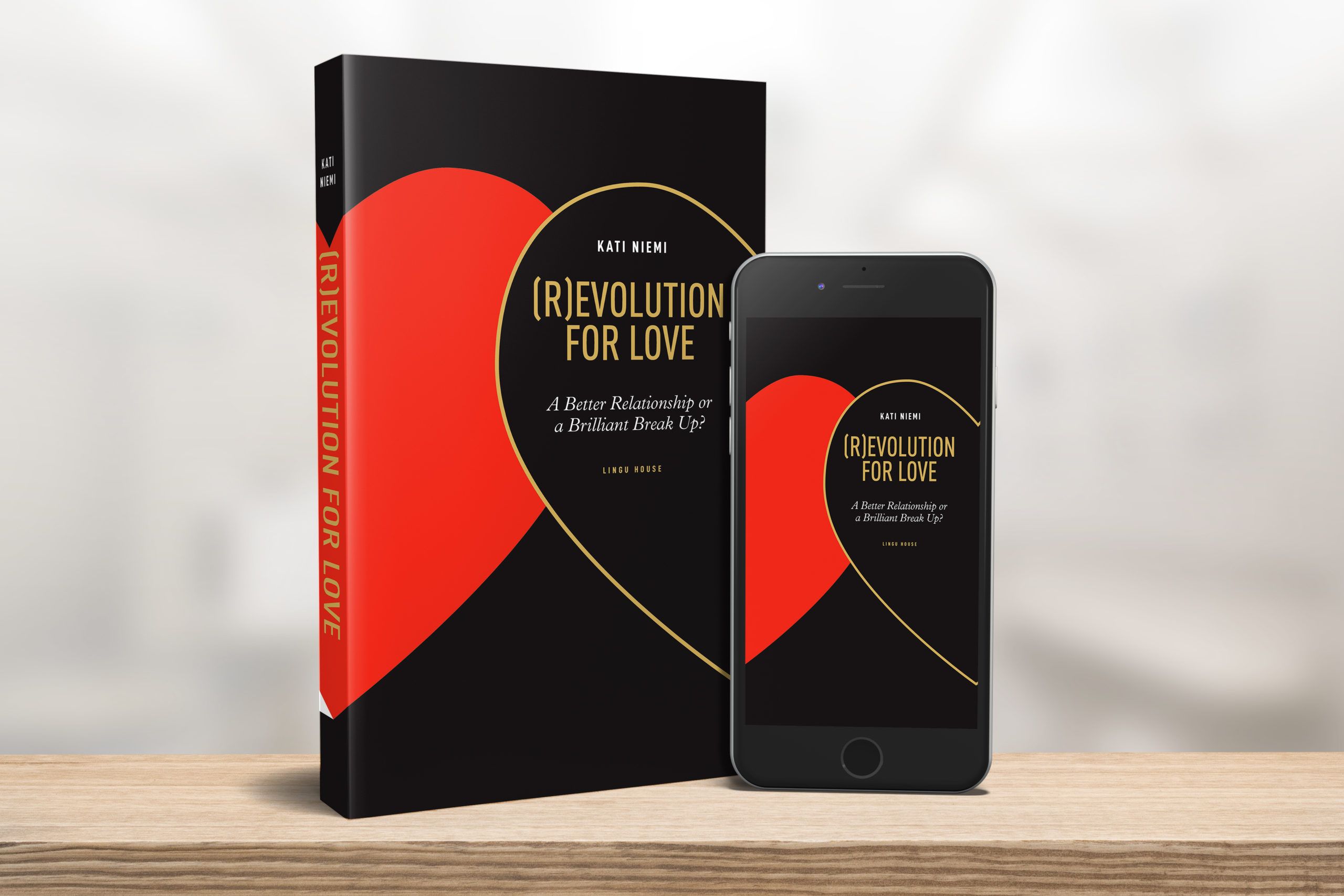
FREE AUDIOBOOK: Audible, Google Play and other stores’ free trial
Audiobook lovers benefit from FREE trial periods of book stores. Enjoy (R)evolution for Love on Amazon Audible, Google Play & other stores
It doesn’t mean that your marriage will end. Many stay put grieving for the love that died without having the courage to move on or to breathe new life into it. Sometimes it would be best that the partners in a dead relationship admit defeat and let each other go. Rekindle that fire in yourself and look for new inspiration and new people to share it with.
When your fire is burning bright, you will find a person who wants to feel its warmth. However, you will not find a new partner or be able to sustain a happy relationship if you use that relationship as your personal life buoy.
You can relight the fire of your existing relationship only if you give up the false idea that the relationship or your partner can carry you through your midlife crisis.
Divorce can’t save you. In middle age – the very latest – you need to finally face up to yourself.
Divorce is not the only way out of your predicament.
Parting ways with your partner for good is not the only possibility. May all you need to part with is the kind of relationship you currently have with your partner. The relationship between two people can be renewed over and over again, every morning, every day, every night. You don’t have to live in a miserable, dead relationship. You can, however, create a new relationship with the same person you still love.
Since a relationship is nothing more than an ever-evolving situation between two persons and not a monolithic entity, the only real elements that can change in a relationship are you two. You both have to be onboard.
Just like you mustn’t cling to your partner, you also mustn’t be the only one keeping it afloat. If your partner wants to take distance from your relationship and you as a person, you had better let them go.
You can’t force anyone to stay in a relationship with you.
If you are the only one who suffers in your relationship and wants to work on it, ask your partner either to pull their weight and take responsibility of your relationship like an adult or leave them.

Online Coaching
Happy to help you! Welcome to book your online coaching session with the certified Coach, NLP Trainer, and Clinical Hypnotherapist Kati Niemi! Please select your
You don’t need them in your life to hold you back just like you should not be a burden holding anyone else back.
Let your partner be free from you, if that is what it takes for them to feel alive again. Similarly, let yourself be free from your partner if that’s what is needed. Even the best of relationships is not necessarily made to last forever, until death do you part. Sometimes a short fling – even an illicit affair – can give you more than you could ever hope for in love and yet letting go may be the best way for that relationship to end.
Midlife crisis may feel like a rollercoaster but you can prepare yourself for future relationship and other age-related crises and minimise that damage.
The crises we go through at various stages of life are milestones of change along our life-long path. That’s why our relationships must also be allowed to shed its skin from time to time. This is important if you want your relationship to flourish for the rest of your lives and not to die prematurely when you feel the seven year itch, have a midlife crisis or finally find yourself after retirement.
If your relationship doesn’t change while life around you does, you will always find yourself mulling over the question of “to break up or not to break up” with every new crisis and period of personal growth.
Midlife crisis can cause serious turbulence.
Some people don’t like flying because of turbulence, and in real life turbulence can make us just as sick. Being caught off-guard by change, you might feel panic and anxiety. Prolonged anxiety can lead to sleep problems and poor quality of sleep, which only exacerbate problems in relationships and life in general. Problems at the workplace or health issues add to stress, which makes matters even worse.
The most insane thing you can do is to lose your relationship because of stress and lack of sleep. There are plenty of effective methods to manage stress and insomnia. Did you know that the word hypnosis comes from the god Hypnos in Greek mythology, the god of sleep? You can probably guess why hypnotherapy is such an efficient tool for managing stress and sleep, and subsequently useful when working on resolving all kinds of issues. Read more about this topic in these articles:
How does midlife crisis show in marriage and divorce statistics?
Using Finnish statistics as an example, the below graph shows you that in the 1990s, people still typically got married under the age of thirty, but nowadays people tend to get married when they are older. Even if the average age of marriage is higher than before, the typical age for divorce is still around 40–50. This means that divorcing is not linked with the length of marriage but the age of the partners. It tends to coincide with the famous midlife crisis.
Below shows the ages of women at the time of marriage and divorce. Find out more about the marriage and divorce statistics for both men and women in the following blog posts:
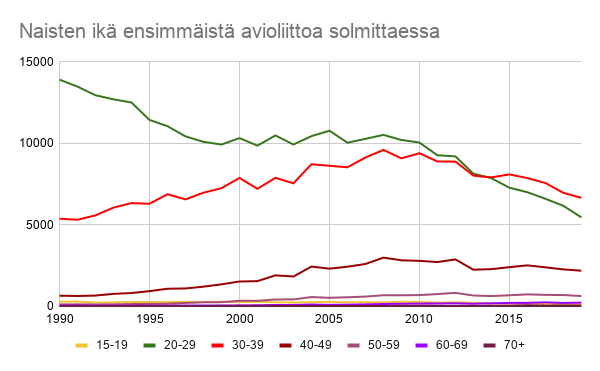
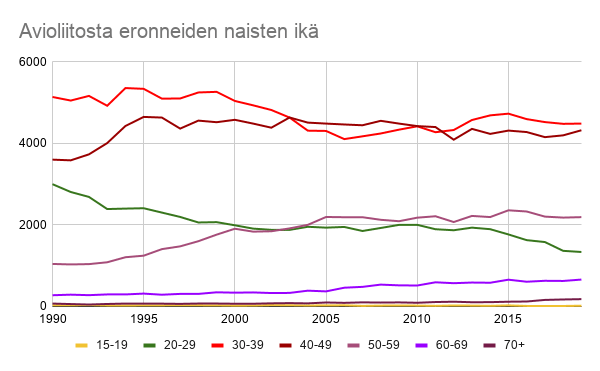
Divorce is most common in middle age. (Source: Statistics
Finland)
Midlife crisis need not end in divorce. But if divorce is what it takes for you to grow, don't be afraid of it.
Some relationships won’t survive crises. Relationships are not always made to last. It does not make those relationships any less worthy than lifelong relationships. The duration of a relationship is no measure of its value and significance. The couple of relationships I have lived through have all helped me grow as a person.
In my current relationship, I feel I am free to grow. I am not the least bit afraid of the moment when the growth path of either one of us takes us further apart from each other. Growth is always a good thing. Change happens for a reason even if we are not yet aware of that reason.
Divorce in middle age is quite common. This does not mean that you and your partner can’t face the challenges of this particular age together and improve your relationship precisely because you are both able to stay open to the “crisis” that has hit you, and most importantly, open to each other. Improving your relationship is possible if you are both ready to accept each other’s growth processes as a couple with all the pain they may cause.
Do make sure that you also engage that 95% additional and renewable capacity of your subconscious, so that you can rebuild your happy relationship every day.
I wish you all the strength in navigating through the confusing seas of middle age. May each day bring you joy in learning!

Motivating You to mindshifting in many ways,
Your Coach Kati Niemi
Clinical Hypnotherapist, NLP Trainer, M.Sc.
[email protected]

“FIVE STARS!” Book reviews: (R)evolution for Love (Amazon Books)
“Five Stars!” Editorial reviews and reader reviews of (R)evolution for Love – A Better Relationship or a Brilliant Break Up? Amazon books

FEEDBACK TO LOVE! Reader reviews (Book+Blog)
RELATIONSHIP GUIDE: BOOK REVIEWS – We are blown over by the feedback the (R)evolution for Love relationship blog and guide have received. WOW!

FREE AUDIOBOOK: Audible, Google Play and other stores’ free trial
Audiobook lovers benefit from FREE trial periods of book stores. Enjoy (R)evolution for Love on Amazon Audible, Google Play & other stores

FREE EBOOK ‘I love you but…’ – To Break Up or Not to Break Up?
Refocus your energy now to improve your love life! This FREE ebook ‘I love you but…’ will help you move towards a better relationship or

How to improve your wellbeing through self-development?
Science has revealed: some adults are not mentally sufficiently developed. How to improve your wellbeing through self-development?

Why does our conscious mind question the power of the unconscious mind?
Is the power of the unconscious mind fake news and is trying to harness it to achieve our full potential a waste of time? What do we mean by the unconscious mind?

INFIDELITY and the collected excuses: The good reasons for cheating
CHEATING: What is a good reason to cheat? What do the cheated partner, “the other woman/man” or the cheater choose to believe in?

What is an open relationship? Does it lead to breaking up?
What is an open relationship? Who are non-monogamous open relationships for? Is your partner suggesting consensual non-monogamy?

Narcissism in a Relationship: “How to Know if My Partner Is a Narcissist?”
What are the signs and causes of narcissism? Can you make a relationship with a narcissist work? Can you heal a narcissistic partner?

Aromatherapy for Libido & Romance – The Best Essential Oils for Love
Sense of smell influences our sexual desire and performance. Aromatherapy tips and the best essential oils for romance, libido, sex and love.

When positive thinking becomes toxic
What is too positive thinking like? Where should we focus the power of our mind and our willpower?

TO BREAK UP OR NOT TO BREAK UP? Should I stay or should I go?
How do you know if you should leave or not. How to make the decision to break up or to improve your relationship? To break up or not?
